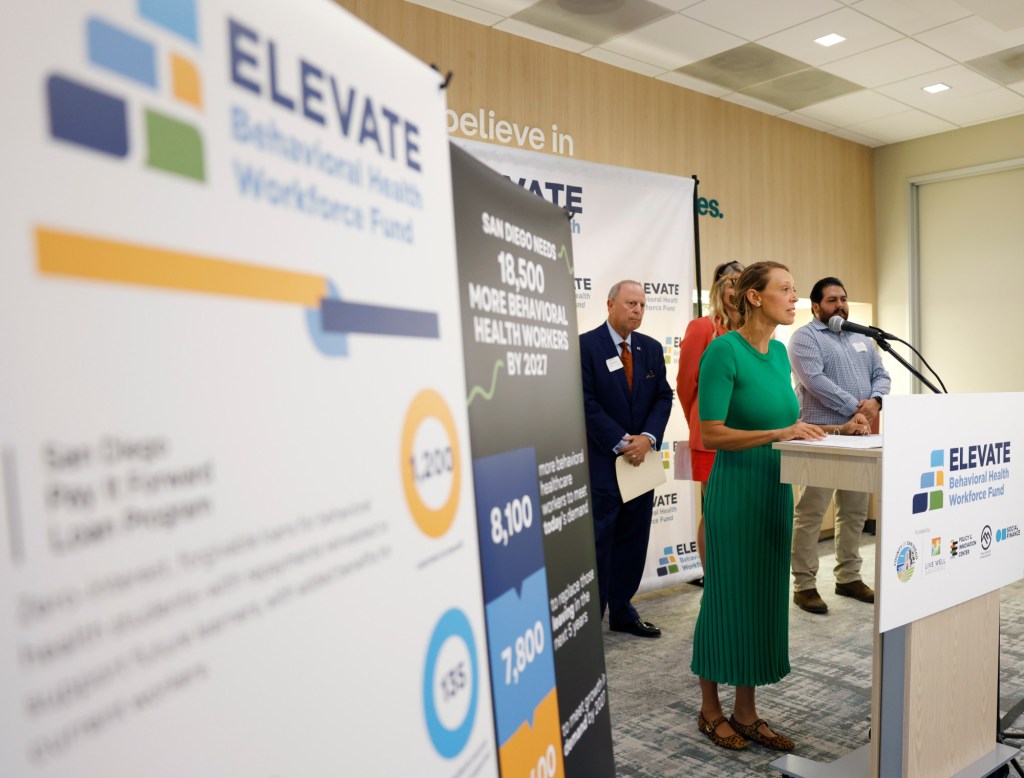San Diego County is responding to a critical mental health staffing shortage by investing $75 million through a new initiative aimed at expanding the local behavioral health workforce. The program, named “ELEVATE,” was launched on Thursday at Liberty Station in Point Loma and is expected to help bridge the gap of 18,500 additional mental health care workers needed by 2027.
This shortage has been highlighted in a 2022 report, which pointed out the chronic understaffing of mental health services in the county and the growing demand for care. While ELEVATE will not singlehandedly resolve this issue, it is a significant step toward ensuring that the community has access to trained professionals.
Initiated by the county’s Board of Supervisors in 2023, ELEVATE leverages a special innovation grant from California’s Mental Health Services Act. The program encompasses a range of initiatives, focusing on training various levels of mental health workers, from apprentices to graduate-level professionals equipped to diagnose and treat mental illness.
The San Diego Policy & Innovation Center was chosen to design and oversee the ELEVATE program in partnership with workforce consulting firm Trailhead Strategies. As reported in The San Diego Union-Tribune’s 72 Hour Project, the region’s mental health care system has been overwhelmed and operating beyond its capacity for several years.
County Supervisor Terra Lawson-Remer participated in the launch of the ELEVATE initiative and stressed the importance of investing in mental health care infrastructure. “With this investment, San Diego isn’t just meeting today’s crisis — we are building a model for the nation. And most importantly, we’re ensuring that when a child, a parent or a neighbor is in crisis, they can get the care they need, right here at home,” she stated.
ELEVATE aims to train approximately 3,000 individuals over the next five years, catering to those seeking entry-level positions as well as those pursuing further education for advanced roles in mental health care. The initiative will support various pathways into the industry, ensuring a well-rounded approach to workforce development.
Highlights of the training programs under ELEVATE include:
– Entry-Level Training: In collaboration with the San Diego Workforce Partnership and the San Diego and Imperial Counties Community Colleges Regional Consortium, the program plans to train about 700 candidates for foundational roles such as substance use counselors, case managers, and community health workers. Trainees will be able to gain hands-on experience through apprenticeships, which resemble vocational training in building trades, allowing them to work while learning.
– Peer Support Specialist Training: Partnering with the National Association of Mental Illness of San Diego and Pacific Clinics, this program aims to prepare 500 individuals for certification as peer support specialists. This informal role is filled by those who have completed their own treatment journeys, utilizing their experiences to assist others.
– Masters-Level Training: Aimed at preparing mental health care workers for advanced licensing roles, this program collaborates with the nonprofit Social Finance to offer zero-interest forgivable loans. Graduates who commit to serving Medi-Cal patients in the county for at least five years can have their loans partially forgiven. San Diego State University and Cal State San Marcos will initially lead this program, with an anticipated 1,200 graduates over the next five years.
– Doctorate-Level Nurse Practitioner Program: In response to the need for psychiatric mental health nurse practitioners, SDSU and UC San Diego are developing a program to train 135 registered nurses in this specialty. Graduates will possess the ability to diagnose mental health conditions and prescribe medications with a psychiatrist’s collaboration. Karen Macauley, director of the School of Nursing at SDSU, highlighted that ELEVATE funding will significantly enhance the capacity of this program.
The inaugural class comprises a dozen students, a number expected to grow in the coming years. The program requires three years of study and 1,000 hours of supervised clinical practice, which will be facilitated through partnerships with local facilities.
Stephanie Gioia-Beckman, a senior director at the Policy & Innovation Center, emphasized the need for a streamlined process to secure clinical supervision hours, which have been challenging for students in the past. “We need a system that kind of marries the curriculum and what’s happening on-site,” she explained.
The ELEVATE initiative is designed to allow participants to continue working while pursuing their educational goals, addressing the financial barriers that often hinder potential candidates from entering the field.
Lawson-Remer reaffirmed the connection between education and practice, noting that providing opportunities to work while learning is vital in expanding San Diego’s mental health workforce. “It’s really important to sort of unlock the bottleneck for folks who otherwise wouldn’t even try to get the degrees that we need,” she remarked, highlighting the importance of this initiative in retaining skilled workers in the county.






